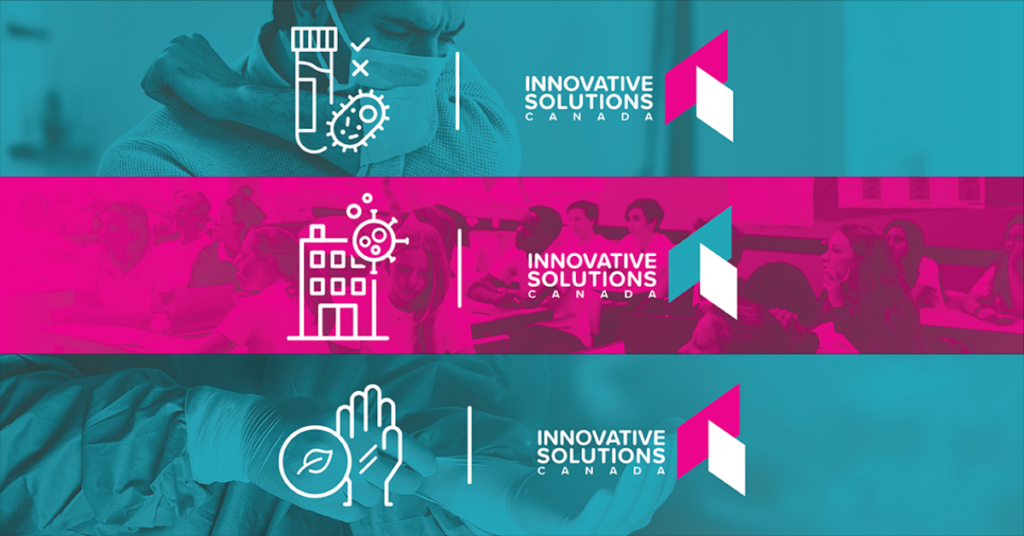
November 26, 2021
Think you can solve any of the below challenges? Compete for funding to prove your feasibility and develop a solution!
COVID-19: Reducing Airborne Transmission of Respiratory Viruses in Buildings Lacking a Mechanical Ventilation System
The National Research Council (NRC) is seeking the Canadian industry to develop and manufacture building technologies and products that can protect occupants by effectively mitigating airborne transmission of respiratory viruses in buildings lacking a mechanical ventilation system.
Ventilation is an important layer of protection against COVID-19 transmission in indoor environments. However, many Canadian buildings lack a mechanical ventilation system that can provide outdoor air and/or air cleaning. Examples of these buildings include schools, long term care homes, and heritage buildings. As a result, there has been an emergence of building technologies and products aimed at mitigating airborne transmission of COVID-19 in buildings lacking a mechanical ventilation system. Unfortunately, many of the technologies and products that have emerged throughout the course of the COVID-19 pandemic lack experimental and field-validation to show they can effectively mitigate airborne transmission of respiratory viruses. In addition, some technologies contain various design flaws that can be detrimental to the health and safety of occupants, making them infeasible solutions. For example, many solutions are too difficult to install/position, too difficult to maintain, too expensive, too energy intensive, not designed optimally in terms of their air intake and exhaust, or result in other unintended negative health consequences (such as the generation of ozone and other contaminants, or produce disruptive levels of noise).
There is a need in the commercial marketplace for alternative building technologies and products that can safely and effectively mitigate airborne transmission of respiratory viruses in buildings lacking a mechanical ventilation system. The proposed solution should be capable of ensuring delivery of clean air to occupied zones both during and after occupancy while maintaining the accessibility and usability of the space.
This challenge closes on December 23rd, 2021 at 2pm EST!
Learn More
COVID-19: Made-in-Canada Compostable Elastomeric Materials for Medical Glove Manufacturing
The National Research Council of Canada (NRC), in collaboration with Environment & Climate Change Canada (ECCC), Health Canada (HC) and Natural Resources Canada (NRCan), are seeking solutions for Made-in-Canada sustainable elastomeric materials, that are compostable, to be used in the manufacturing of an equivalent alternative to disposable medical gloves.
The COVID-19 pandemic has generated an increased consumption of disposable personal protective equipment (PPE) by healthcare workers and by the general public. As of June 29, 2020, based on federal government projections for PPE demand over the next year, it is estimated that approximately 63,000 tonnes of COVID-19 related PPE will end up as waste, being ultimately landfilled. This includes an estimated 4 billion pairs of medical gloves with an estimated weight of 16 tonnes.
To reduce the environmental footprint of PPE in Canada, the Government of Canada is supporting the development of solutions to manufacture more sustainable PPE and to better manage their end of life. Strategies include re-usability, alternative materials and novel recycling technologies, as well as compostability.
This challenge is in support of the alternative materials and compostability elements of that strategy. For this reason, the Government of Canada is seeking solutions for Made-in-Canada sustainable elastomeric materials that are compostable to be used in the manufacture of an equivalent alternative to disposable medical gloves, as an eco-friendly and safe replacement.
This challenge closes on December 23rd, 2021 at 2pm EST!
Learn More
COVID-19: High Performance Low Cost Detection of Biomarkers
National Research Council of Canada (NRC) is seeking robust cost effective point-of-care testing innovations. The innovations should allow qualitative or quantitative detection of one or multiple biomarkers, in a single specimen, at low picograms per milliliter concentrations via non-invasive methods to enable screening or monitoring health status by minimally trained users.
There are numerous biomarkers present at low concentrations whose detection can provide valuable information pertaining an individual’s health. Examples include but are not limited to; (i) antigens derived from SARS-CoV-2 whose presence in asymptomatic individuals is indicative of exposure or infection, (ii) cardiac troponin which when elevated is indicative of cardiac risk, (iii) various cytokine markers related to the “cytokine storm” seen in COVID-19 patients.
NRC is seeking innovations which can be used in diverse settings by minimally trained users to assess a human sample for the presence or quantity of one or multiple biomarkers, using a single device (i.e. multiplex detection) as to provide information to inform a subsequent course of action. The course of action may be that an individual seeks specific medical care, or following a proactive screening for an infectious disease and not needing to modify their behavior, or that they are suspected to have been exposed to an infectious organism and that they need to seek further testing or care.
While there are marketed products which can detect low concentrations of the aforementioned as well as other biomarkers, those products are confined to laboratories. The current COVID-19 pandemic has illustrated that there is significant need for an innovation which would allow individuals, or health care teams to test samples obtained via non-invasive means for the presence of one or multiple biomarkers present at low concentrations outside of traditional settings. The ability to detect and or quantify such biomarkers at low concentrations in nontraditional setting could prevent inadvertent spread of disease, or remote evaluation of individuals thus decreasing the burden on health care systems. Unfortunately, we do not currently have appropriate innovations.
This challenge closes on December 23rd, 2021 at 2pm EST!
